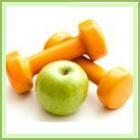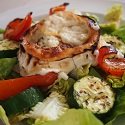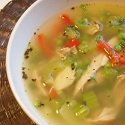Lose Weight
![]() Calories in Food
Calories in Food
![]() Calories in Dairy
Calories in Dairy
![]() Calories in Ricotta Cheese
Calories in Ricotta Cheese
Calories in Ricotta Cheese,
Ricotta Nutrition Facts
How many calories in Ricotta cheese? See below, the Ricotta cheese calories for the different serving sizes. We provide you with Ricotta cheese nutrition facts and the health benefits of Ricotta cheese to help you lose weight and eat a healthy diet.
Ricotta cheese originates from Italy, creamy in consistency and ideal for cooking. It’s generally made from cow’s milk but variants from both sheep and goat’s milk are available. It is made from the whey left over from making cheese, so has the benefit of having half the fat of most other cheeses. For example, made from whole milk, it contains approx. 13g per 100g of fat. Still, seek out low fat varieties. Unfortunately though, it contains a lot less protein than other cheeses.

It does provide a good source of vitamins A, B1-B3, B5, B6, B12, D, E, K, calcium, phosphorus, potassium and selenium.
Ricotta
is great for healthy teeth and bones. Other Ricotta benefits are
believed to include added protection against heart disease given its
rich omega 3 and 6 content.
Compare calories in Ricotta cheese with the other calories in cheese and dairy products.
Calories in Ricotta Cheese, Part Skim Milk
Refuse: 0%| Serving Size | Calories per Serving |
| 100 grams | 138 kcal (578 kJ) |
| 1 cup, 246 grams | 339 kcal (1422 kJ) |
| 1 oz, 28.35 grams | 39 kcal (164 kJ) |
| 0.5 cup, 124 grams | 171 kcal (717 kJ) |
Cheese, Ricotta, Whole Milk
Refuse: 0%| Serving Size | Calories per Serving |
| 100 grams | 174 kcal (728 kJ) |
| 1 cup, 246 grams | 428 kcal (1791 kJ) |
| 0.5 cup, 124 grams | 216 kcal (903 kJ) |
Ricotta Cheese Nutritional information
| Nutritional value per 100 g (3.5 oz) | |
|---|---|
| Proximates: | |
| Water | 71.70 g |
| Energy | 728 kJ (174 kcal) |
| Carbohydrates | 3.04 g |
| Sugars | 0.27 g |
| Fat | 12.98 g |
| Protein | 11.26 g |
| Minerals: | |
| Calcium, Ca | 207 mg (21 %) |
| Iron, Fe | 0.38 mg (2 %) |
| Magnesium, Mg | 11 mg (3 %) |
| Phosphorus, P | 158 mg (16 %) |
| Potassium, K | 105 mg (2 %) |
| Zinc, Zn | 1.16 mg (8 %) |
| Copper, Cu | 0.021 mg (1 %) |
| Manganese, Mn | 0.006 mg (0.3 %) |
| Selenium, Se | 14.5 mcg (20 %) |
| Vitamins: | |
| Thiamine (Vit. B1) | 0.013 mg (1 %) |
| Riboflavin (Vit. B2) | 0.195 mg (11 %) |
| Niacin (Vit. B3) | 0.104 mg (0.5 %) |
| Pantothenic acid (B5) | 0.213 mg (2 %) |
| Vitamin B6 | 0.043 mg (2 %) |
| Folate (Vit. B9) | 12 mcg (3 %) |
| Vitamin B12 | 0.34 mcg (6 %) |
| Vitamin A | 445 IU (9 %) |
| Vitamin E | 0.11 mg (0.6 %) |
| Vitamin D | 10 IU (2.5 %) |
| Vitamin K | 1.1 mcg (1.4 %) |
| Percentages are relative to US Recommended Daily Intake (RDI) for adults. | |
Author: Lana Soko
You Might Also Like:
Like This Page?
|
Share This Page:
|
Search Our Site:

Free E-Book:
We Recommend:
Looking to get your body into great shape? Get the very best results for your efforts and money! Save your valuable time from surfing the internet. These are theBestselling Weight Loss Programs

Programs that work and have thousands of satisfied customers worldwide!

 |




